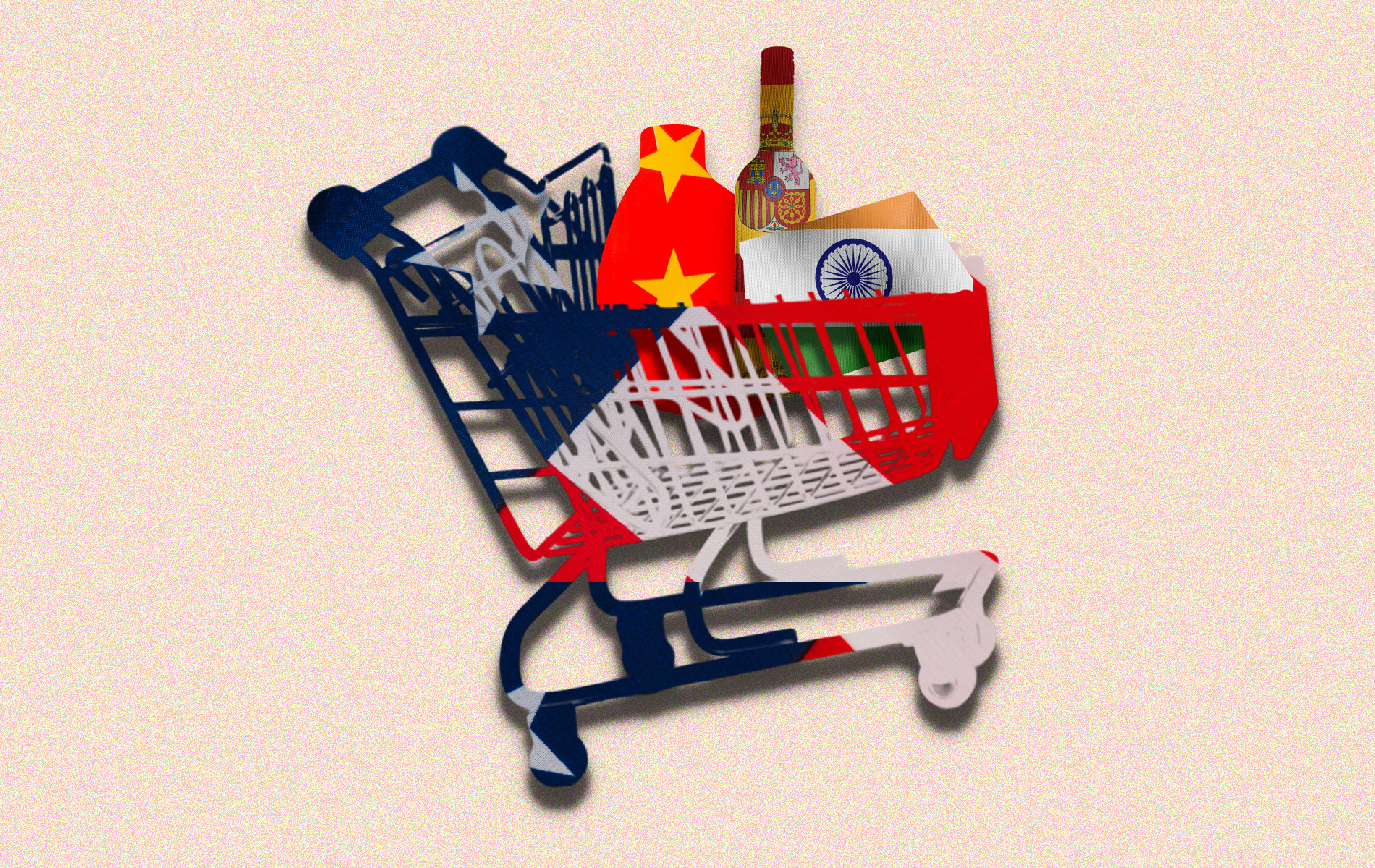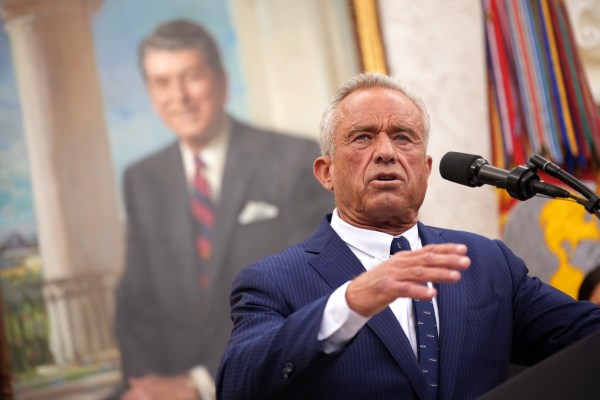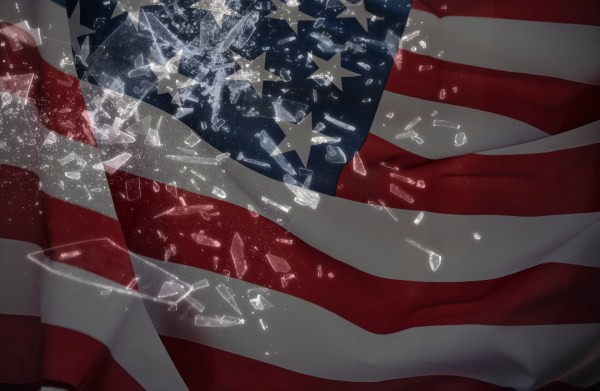There’s this great scene in the 1984 film Moscow on the Hudson. The late actor Robin Williams’ character, a Russian musician who defected from the Soviet Union, is shopping in an American grocery store for the first time and, overwhelmed by the several coffee brands to choose from on the shelves, nearly has a nervous breakdown.
As a 13-year-old watching this flick at the height of the Cold War, I found this amusing, but was more struck by the defection scene itself, which is punctuated by a police officer telling the Soviet handlers trying to stop Williams: “This is New York City, the man can do whatever he wants.” That line, to me, was the essence of American freedom and what differentiated the United States from the USSR. But I’ve been thinking about this movie, and the grocery store scene, anew lately amid President Donald Trump slapping tariffs on virtually all foreign commodities and products imported from nearly every country on earth.
That Americans can purchase the product of their choice among countless available domestic and foreign brands is a quintessential part of living in a free society.
And yet, our leaders in Washington, D.C., have forgotten that. At least that’s what it seems like based on what they’ve been doing and the rhetoric they’ve used as justification. Not only is Trump, supported by the Republicans who control Congress, implementing tariffs that threaten to make some imports prohibitively expensive or outright unavailable, government officials are telling us that we don’t need all of those choices anyway—that it’s for our own good.
“Access to cheap goods is not the essence of the American dream,” Treasury Secretary Scott Bessent said in March during remarks to the New York Economic Club that received quite a bit of attention. Commerce Secretary Howard Lutnick has also tried his hand at rationalizing the impact of tariffs. “Yes, some products that are made foreign, might be more expensive. But American products will get cheaper and that’s the point—buy American, made by great Americans,” Lutnick said, also in March, in an interview on NBC News’ Meet the Press. “You’re going to be helping Americans by buying American.”
That particular statement—that Trump’s policy is going to steer Americans toward helping their fellow citizens—is compelling. It’s among the reasons why Trump’s trade agenda is not being rejected out of hand by voters and small business owners despite its clearly negative impact so far on the economy. But many economists warn that not only will the president’s liberal use of tariffs fail to deliver the economic miracle he promises, the result will yield fewer consumer choices.
That’s academic-speak for: Americans will have less freedom to buy the products they prefer.
“Conservatives used to believe in free markets and voluntary exchange. If I want to buy French wine and the French want to sell it to me, who is the government to regulate or tax that transaction?” lamented Jessica Riedl, an occasional contributor to The Dispatch and an economist at the Manhattan Institute, a conservative think tank in New York City.
“Now we’re told that you can’t buy French wine even if they want to sell it to you because the common good is going to force you to buy a wine you want less in the United States,” Riedl continued. “Seventy-five percent of the world’s GDP is produced outside of the United States. That’s a lot of markets to deny Americans.” (We’ll get back to imported wine later.) Riedl also rightly pointed out that some commodities, like diamonds and certain rare earth minerals, aren’t sourceable at all in the U.S., while some products, like bananas and coffee beans, aren’t sufficiently available domestically to satisfy demand.
“The notion that we can make everything in America defies the reality that we have our own climate, our own natural resources that’s different than what’s available elsewhere,” she said.
Consumer choice, or lack thereof, is not just some niche issue, but a consequential aspect of American history that has been studied for decades—and hotly contested by historians.
Dana Frank, professor emerita of history at the University of California, Santa Cruz, happens to disagree with this framing of consumer choice. “I don’t think consumer choice is one of the basic features of freedom in the United States,” Frank, author of Buy American: The Untold Story of Economic Nationalism, told me in an email exchange. “It assumes that everyone in the U.S. ever did have something called ‘freedom of choice.’ Poor people never did, and don’t today.”
But Lawrence B. Glickman, a professor of American studies at Cornell University, told me over the phone that consumer choice, and particularly exercising that choice for the purposes of political activism, is deeply embedded in our history and key to who we are and how we perceive ourselves as citizens. Ever heard of the Boston Tea Party? Here, a group of future Americans got together and destroyed a whole shipment of tea to protest an import tax (a tariff of sorts) that they opposed, in part because they resented being forced to pay a levy approved by a legislative body—the British Parliament—in which they had no representation.
“For most of American history, and for most Americans, consumption is seen as a realm of freedom, within certain constraints—not buying goods made by an enemy or goods that are made in immoral conditions,” said Glickman, author of Buying Power: A History of Consumer Activism in America, adding that with some exceptions, Americans have often viewed consumption as a realm of “political expression.” He explained: “Being told, without really clear reasoning, why goods are becoming much more expensive now, is kind of an affront to that traditional way of thinking about what consumption is.”
Sometimes tariffs are defensible—even advisable.
There’s a strong case to make, as both Democrats and Republicans have, that China is a dangerous American adversary requiring aggressive confrontation to protect U.S. national security. As such, it might make sense to wield tariffs to ensure we’re not dependent on China for tech-related components and those rare earth minerals essential to the production of military equipment.
Decoupling the U.S. economy from China is another proposal bandied about on both sides of the aisle. Doing so might require a hefty tariff regime as a means to motivate American firms manufacturing in China to re-shore to the U.S. or relocate to allied countries. Yet because Beijing is angling to supplant us as the globe’s preeminent superpower, it’s an idea that deserves consideration even though it might cause economic pain for consumers, corporations, and small businesses.
However, while countering China is a focus of the Trump administration, it’s not the primary one. Generally, Trump and his top lieutenants complain about so-called trade deficits, singling out not just China but every country. “For decades, the United States slashed our trade barriers on other countries while those nations placed massive tariffs on our products,” Trump said on April 2, while making his big announcement that countries would now face “reciprocal” levies on imports. “But those days are over.”
Since then, the president has vacillated between imposing tariffs and pausing them, claiming that the new policy is intended to “rebalance” international trade so that American exporters are treated fairly by foreign countries and arguing that the intent is to overhaul global trade so that foreign imports are effectively priced out of the U.S. market. It’s even unclear if the administration would be satisfied by foreign investors setting up shop in the U.S., despite Trump declaring it a major priority.
“This business model, where BMW and Mercedes come into Spartanburg, South Carolina, and have us assemble German engines and Austrian transmissions—that doesn’t work for America. It’s bad for our economics,” Peter Navarro, White House senior adviser for trade and manufacturing, said in an April 7 CNBC interview. (The German automobile manufacturers Navarro referenced have built cars in the Palmetto State for three decades, and Republicans there are only too happy to have them.)
As it happens, I prefer American automobiles.
First, there was the Plymouth Sundance, two-door, five-speed turbo. Not bad for an 18-year-old on a limited budget. Later, there was the Ford Ranger XLT pickup and the Ford Escort ZX2, five-speed, complete with moon roof and compact disc changer. When my oldest son was born, my wife and I did the really typical new parent thing and purchased a Jeep Cherokee sport utility vehicle. After our youngest son followed three years later, we leased a Ford Explorer Sport SUV because we needed third-row seating. After that, it’s been more leased Explorers and lately, Lincoln Aviators (we upgraded to a 2025 model this past winter).
But here’s the thing: Every purchase and lease has been our choice, not our government’s, limited only by our wallet or the practical necessities that come with having to shuttle children and visiting grandparents around town. Indeed, while I was choosing American, some of my friends and relatives were buying Japanese; others German; others British; others Korean.
But as promised, let’s get back to the subject of imported wine.
As a product, wine is less wrapped up in the politics of manufacturing and patriotism. But as our editor, Steve Hayes, detailed in a richly reported piece, the affordability and availability of foreign wine is threatened all the same by Trump’s broad use of tariffs (and so are the livelihoods of the American importers and import businesses that distribute said foreign wine).
On the surface, it’d probably be hard to find a less sympathetic industry for tariff opponents to focus on than those in the wine importing business. Nobody’s going to shed any tears for the rich guy with a French wine fetish whose $500 bottle might soon cost $600. But while it’s true that fine wine collectors and those who sell to them can adjust to higher costs, many smaller companies that work in the wine business cannot.
“When you look at $10 spent on wine in the U.S., 80 percent of that $10 is going to U.S. businesses,” says Scott Ades, president of Dalla Terra Winery Direct, a California-based importer specializing in Italian wines. “And so if you put in place a tariff that raises the price of those goods so that they’re no longer affordable, 80 percent of the pain is going to U.S. businesses. If there were tariffs put in place at 50 percent, for example, our company would go out of business.”
“And that would have a chain reaction,” added Ades, who spoke to me from Tuscany. “Distributors would be going out of business, restaurateurs and retailers would be going out of business.”
What does this have to do with choice and freedom?
Let’s use my boss as an example.
Steve’s thing isn’t French wine, which was the example Riedl used to discuss the significance of consumer choice, heretofore a staple of the American marketplace, as it relates to a healthy economy. Steve likes Spanish wine. It’s an obsession with him; I don’t think he drinks anything else. But that’s the point—Steve prefers Spanish wine over other kinds of wine: Australian, Croatian, French, Italian, Israeli, German (think Riesling), Lebanese, Portuguese, and yes, American, be it from California, Oregon, Washington state, etc.—you get the drift.
It sounds like a first-world problem. So what if Steve can’t get his Spanish wine—or if it’s less affordable? So what if all the people I know who prefer wines from all of those other foreign countries can’t get what they want? American wines from the regions I noted are world-class. Literally, they regularly win international awards. Personally, I could live a long time on California red zinfandel from Napa Valley and neighboring Sonoma County. But the point is, we’re Americans, and we’re supposed to get to choose. (Also: Tariffs on wine imports could spell economic hardship for domestic wine as well, rather than the other way around.)
“Republicans used to be in favor of free trade—both for economic benefit and as a fundamental human right to be able to buy and sell as one please,” said James Pethokoukis, a senior fellow at the American Enterprise Institute, a conservative think tank in Washington, D.C., where he studies economic growth and innovation.
Apropos of how I’ve been thinking about the issue of consumer choice and tariffs and its centrality to American freedom, Pethokoukis referenced a 1989 trip to the U.S. by Boris Yeltsin, the Soviet politician who would eventually serve as the first president of post-Cold War Russia.
“Recall the famous incident of Boris Yeltsin visiting an American supermarket and being amazed at the vast consumer choice,” Pethokoukis said. “That was always a joke we made about the Soviet Union: that there was nothing on the shelves.”
Which brings us back to Moscow on the Hudson and Robin Williams’ character, saxophonist Vladimir Ivanoff.
I can’t claim to know for sure what screenwriters Leon Capetanos and Paul Mazursky (Mazursky also directed the film) had in mind with the grocery store scene that has been stuck in my brain for the last 40-plus years. I have no clue as to the filmmakers’ politics, although with Hollywood being Hollywood, even back then, it’s certainly possible they were satirizing American consumer culture, not celebrating American exceptionalism.
But I suppose it’s not surprising, in light of recent and ongoing actions by a certain high-ranking elected official here in Washington, D.C., that I’ve found a deeper and enduring message about the U.S. and what it means to be an American in the prototypical American art form: the motion picture. It’s a message that I think Ivanoff summed up best, when, describing life in his new and sometimes bewilderingly free country, he says: “Yesterday I bought my first pair of American shoes. They were made in Italy.”










Please note that we at The Dispatch hold ourselves, our work, and our commenters to a higher standard than other places on the internet. We welcome comments that foster genuine debate or discussion—including comments critical of us or our work—but responses that include ad hominem attacks on fellow Dispatch members or are intended to stoke fear and anger may be moderated.
With your membership, you only have the ability to comment on The Morning Dispatch articles. Consider upgrading to join the conversation everywhere.